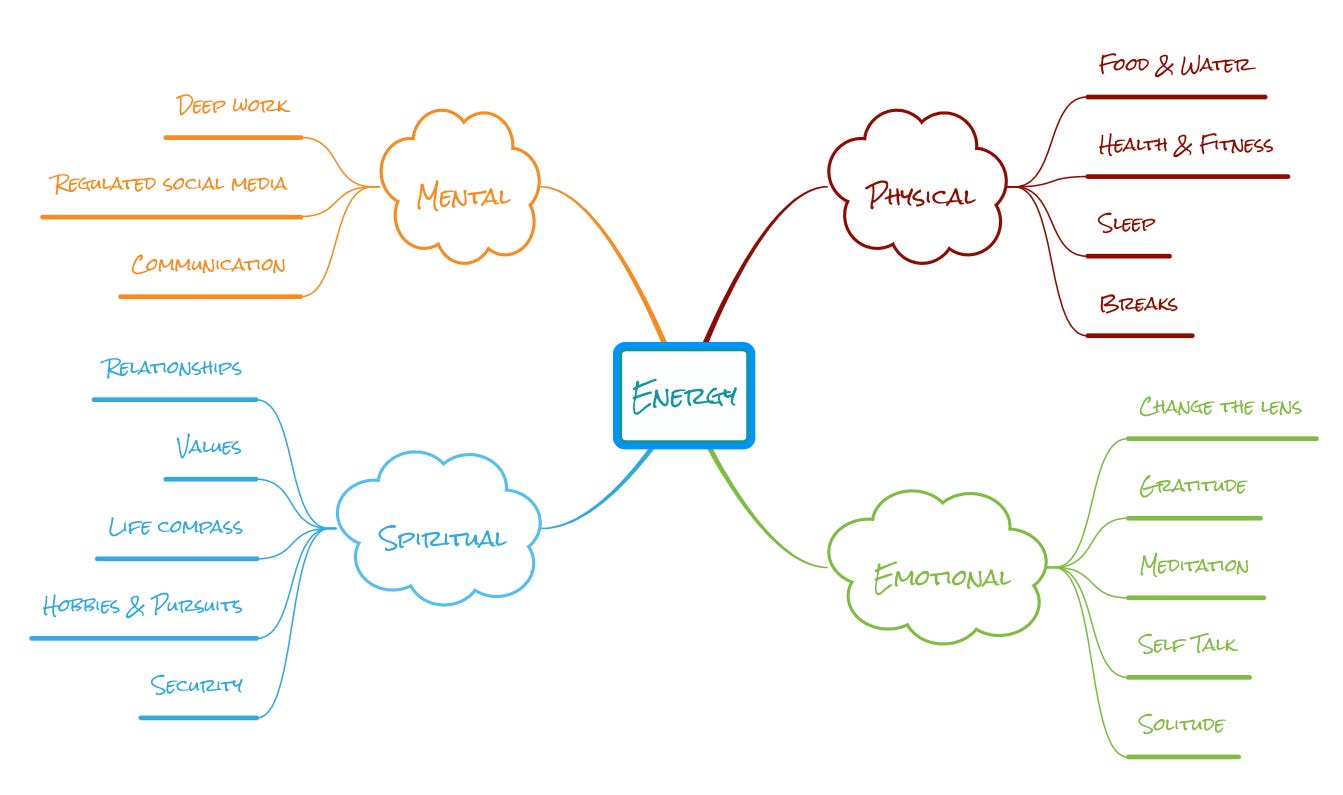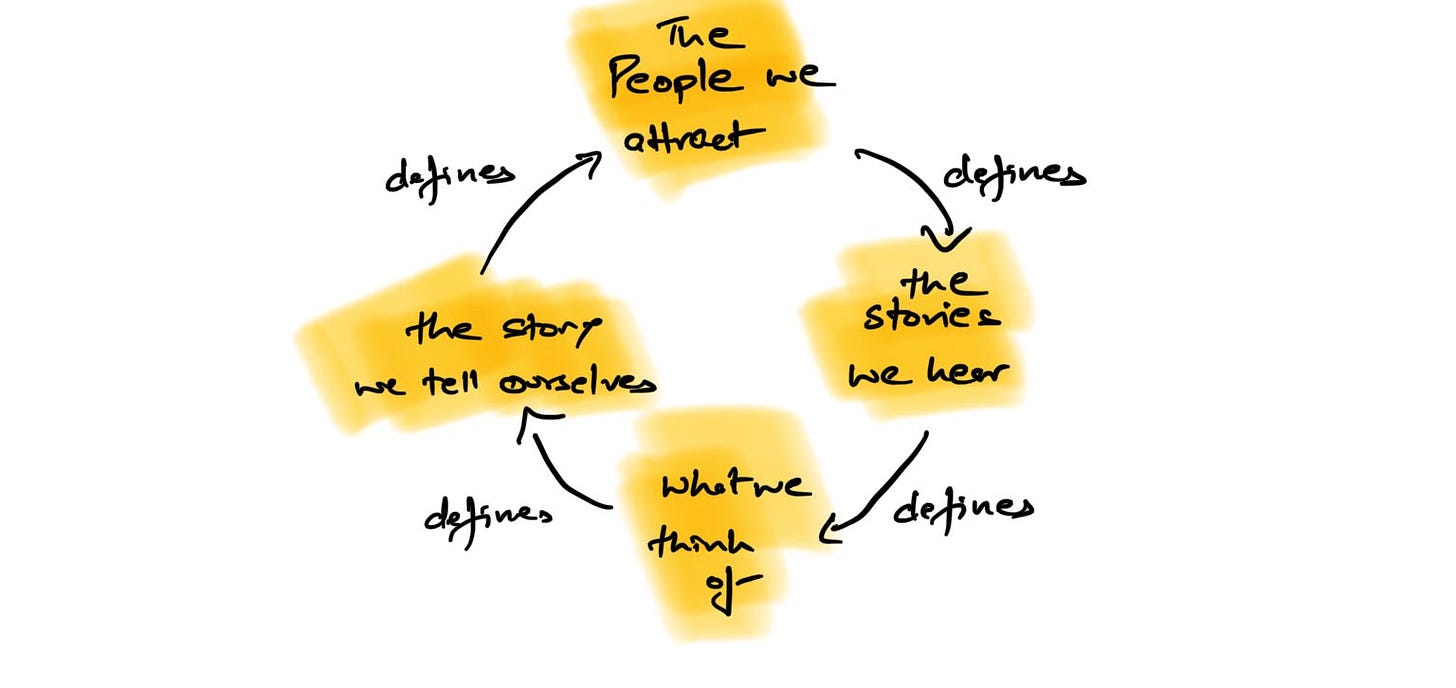Hi friends,
Greetings from the comfort of a long weekend :-) and welcome to the new subscribers.
This is 10th edition of ‘The High Five’ and there’s a lot to share. I have a piece about ‘energy management’, one about self-awareness and a very succinct illustration about how/why some relationships matter more.
So here we go, with ‘The High Five’ of this week:

Productivity: Energy Management >>> Time Management
A few years ago, I had a moment of epiphany when I realized that Time Management is actually a myth. Sure, we measure time, but ultimately time is a finite resource. No matter how we manage it, all we get is just 24 hours in a day. So when we say time management, what we actually mean is our attention management. When we feel stressed out due to lack of time, we basically are regretting the fact that we couldn't prioritize something that deserved a higher priority in our day, and in effect, we are regretting our judgment error. This week, I read this piece on HBR that argues along the same lines but pivots Energy Management as an alternative to Time Management. It makes sense because, if you look at it, time is a depleting resource in a day, whereas energy is something you can gain, manage and control. Here is some actionable advice on Energy Management.

There are 4 dimensions to Energy Management:
Physical Energy - This is our body's physiological state, response and behaviour as the day progresses. We can improve our appetite for Physical Energy by carving out habits/routines such as work-outs, healthy food, good sleep, taking breaks to stretch a bit etc. Our body experiences Ultradian Rhythms, which are 90min-120min cycles during which, our energy levels experience a trough. So building some routines through which we constantly replenish our physical energy helps us to deal with these troughs better.
Mental Energy - This is our ability to concentrate, analyze and be creative. Shifting our focus to many things intermittently depletes our mental energy, resulting in lack of focus, low quality of creative output etc. It is better to engage in ‘Deep Work’ for 90-120mins (taking breaks in between) than to juggle between multiple types of tasks. Some tips to conserve and manage mental energy include: checking email fewer times a day, using Pomodoro timers, regulated usage of social media, ignoring mobile notifications for some chunks of time etc.
Emotional Energy - It is immensely important to be aware of our emotions at various points of the day so that external triggers don't take control of our emotions. There is a lot of research that says that positive emotions help us perform better. We experience them based on how we interpret the events that happen to us and the stories we tell ourselves about those events. If we experience a negative emotion, we need to change the lens of looking at it and ask ourselves questions like, "How would X react in the same situation? How might I view this situation 6 months from now? Outcomes aside, what can I learn from this and how can I grow from it?". There are other routines such as appreciating people, practising gratitude, that help us reset our emotional energies.
Spiritual Energy - This is that energy which gives us peace of mind and a sense of deep satisfaction when ‘what we do’ aligns with the sense of meaning we pursue in our work. This resides in our inner being; we could call it the centre of our Ikigai. This energy depletes very quickly if we don't experience that resonance between our pursuits and our values and purpose. We all set a certain 'North Star' for ourselves, in terms of what we want to be known for, what we want to stand for, and what gets associated with our identity. This is beyond the goals we set or the promotions we target. We often look at our mental compass, a.k.a introspection, to see how near or far we are from our future self, encompassing our desired state of being. It is important to build routines that cast a vote in favour of this future state of being. And these routines could be spending quality time with family, pursuing a hobby every day, learning something, doing something that we value a lot etc. Having a dedicated time every day, no matter how small in duration, to replenish our spiritual energy will open many positive emotions in us, thereby contributing to our well-being. This influences how we approach the other 3 energies.
We tend to view energy with a single lens, mostly relating to physical capacity. Recognizing that it has multiple dimensions, will help us to develop habits that target those dimensions separately, so that the results add up to less stress, more focus, qualitative output, and of course, better utilization of the same 24 hours we have each day.
Psychology: A podcast on Self-awareness
I heard this podcast which was an interview with the author of the book - "Insight”, Dr Tasha Eurich. There were some interesting insights in the podcast, taking off right from a very telling statistical data-point: About 95% of people think that they are very self-aware people whereas, in reality, only 10%-15% turn out to be self-aware. The author has done a lot of research on self-awareness and shared these highlights:
There are two types of self-awareness: Internal and External. Internal self-awareness is about knowing yourself, your aspirations, your behaviour patterns etc. External self-awareness is about knowing how others view and perceive you. Both types are mutually exclusive, meaning - having one doesn't guarantee the other.

People routinely engage in "cognitive dissonance", without realizing it. 80% of the people are lying to themselves, about whether they are lying to themselves (or not). Hence, the types of questions we ask ourselves and the processes we use to gather feedback, helps us increase self-awareness.
The pillars or levers that lead to better self-awareness: Values, Passions, Aspirations, Patterns, Influences, Reactions, Impact. Reflecting about them periodically can increase our self-awareness.
“What” questions over “Why” questions: People with high self-awareness do not ask "why" questions (For example: why is this happening to me, why can't they understand such a simple thing etc.). Instead, they tend to ask "what" questions (such as: what's going on here, what could be done to prevent this, what can I do better etc.). That's because "why" questions are very emotionally loaded, problem-focused and have a tendency to trap us in past or in the quicksand of helpless regret, where we are stuck ranting. "What" questions, on the other hand, are solution-focused and keep us level-headed and moving forward.
Feedback is a great way to increase external self-awareness, but only if you reach out to people you trust and those who are genuinely willing to help you.
Dr Tasha contends that behaviour change, obviously, is the key to increasing internal and external self-awareness. She however cautions, that one needs to try changing only one behaviour at a time. Changing too many habits or behaviours (shifting too many levers) at a single time will be counter-intuitive. The real results of increased self-awareness will begin to show only when one behavioural change gets internalized completely, before moving on to the next.
Relationships: People we attract

This succinct illustration by Ankur Warikoo builds further on the well-known adage - “You are the average of the five people you spend the most time with”. This doesn’t need any elaboration.
A quote that resonated with me: “The world we live in, is vastly different from the world we think we live in” - Nassim Nicholas Taleb.
A question I am pondering about: If, by some biological miracle, we no longer need to sleep every day, would we use that extra time for doing more work or for enjoying life?
On Spotify, I found this beautiful instrumental rendition of the kriti ‘Entha Muddo’ (composer: Thyagaraja; raagam: Bindumalini) by U. Srinivas, the prodigy who left too early.
Which of the above insights resonated with you the most? Please do share with me in comments or emails. And if you liked this edition, please forward it to a friend who might like it too. Have a wonderful weekend.





Very good set of thoughts and frameworks.
Effectively driven set of thoughts! All these topics have influence on workings and experiences of life!